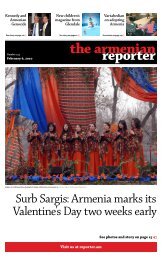National, International, Armenia, and Community News and Opinion
National, International, Armenia, and Community News and Opinion
National, International, Armenia, and Community News and Opinion
- No tags were found...
You also want an ePaper? Increase the reach of your titles
YUMPU automatically turns print PDFs into web optimized ePapers that Google loves.
16 The <strong>Armenia</strong>n Reporter | May 2, 2009<strong>Armenia</strong>ARF leaves <strong>Armenia</strong>n government, citingdisagreements on Turkey policyby Vincent LimaYEREVAN – The <strong>Armenia</strong>n RevolutionaryFederation (Dashnaktsutiun)on April 27 withdrew from <strong>Armenia</strong>’sgoverning coalition, citing“insurmountable disagreementson matters of principle” regarding<strong>Armenia</strong>’s foreign policy. A partydeclaration referred specifically tothe timing <strong>and</strong> substance of a jointstatement of the foreign ministriesof <strong>Armenia</strong> <strong>and</strong> Turkey on the eveof April 24.The withdrawal of the party,which controls 16 seats in the 131-seat parliament, will not cause thecollapse of the four-party coalition,but has significantly exp<strong>and</strong>ed theparliamentary opposition, whichuntil now included only the HeritageParty, with seven seats, <strong>and</strong>one or two unaffiliated members ofparliament.“The ARF can acquiesce in manythings, but not when it comes toissues <strong>and</strong> ideas it holds sacred,”Armen Rustamian, representativeof the ARF’s Supreme Body of<strong>Armenia</strong>, told reporters on April 27.Mr. Rustamian, a member of the<strong>National</strong> Assembly, has resigned aschairperson of the parliamentarySt<strong>and</strong>ing Committee on ForeignRelations.Also resigning from portfoliosallocated to the party through thecoalition agreement are Ministerof Education Spartak Seyranian,Minister of Agriculture AramaisGrigorian, <strong>and</strong> Minister of Labor<strong>and</strong> Social Affairs Arsen Hambartsumian.Deputy speaker of parliamentHrair Karapetian <strong>and</strong> thechairperson of the parliamentarySt<strong>and</strong>ing Committee on Defense,<strong>National</strong> Security, <strong>and</strong> InternalAffairs Artur Agabekiansubmitted their resignations onMonday.[Under a parliamentary rule adoptedsome months ago with ARFsupport, members of oppositionparties are to chair some parliamentarycommittees. The rule wasmeant to come into effect with thenext parliament, but the Speakerinvoked it on behalf of the coalition,“urging the <strong>Armenia</strong>n RevolutionaryFederation faction to withdraw,while being in opposition, ArmenRustamian’s <strong>and</strong> Artur Agabekian’sresignations.” The ARF agreed <strong>and</strong>the two men will retain their posts.]Turkey policyThe ARF has repeatedly expressedmisgivings about <strong>Armenia</strong>-Turkeytalks initiated by <strong>Armenia</strong>’s PresidentSerge Sargsian. It organizedstreet demonstrations to protestthe visit of Turkey’s PresidentAbdullah Gül to <strong>Armenia</strong> on September6, 2008.As the talks continued, <strong>Armenia</strong>nobservers, including the ARF,expressed concern that Turkeywas sticking to its preconditionsfor the normalization of relations.These preconditions have included<strong>Armenia</strong>n concessions in Nagorno-Karabakh <strong>and</strong> the removal of theinternational recognition of the<strong>Armenia</strong>n Genocide from <strong>Armenia</strong>’sforeign-policy agenda.Mr. Sargsian on April 20 told theWall Street Journal that his government<strong>and</strong> “the Turkish side in thenegotiations supported the ideathat we are negotiating withoutany preconditions.” But, he added,“I think already now the motivationof Turkey has decreased, because. . . Prime Minister Erdoganis now offering preconditions.”Indeed, on April 19 Mr. Erdoganhad announced, “If the <strong>Armenia</strong>noccupation of Azeri territory continues,Turkey will not open itsborder gate.”Nonetheless, two days later, <strong>Armenia</strong>’sForeign Ministry <strong>and</strong> itsTurkish counterpart issued a jointdeclaration claiming the “two partieshave achieved tangible progress<strong>and</strong> mutual underst<strong>and</strong>ing” inthe process of normalizing theirbilateral relations.The statement, coming on theeve of April 24, the day <strong>Armenia</strong>nsworldwide commemorate the <strong>Armenia</strong>nGenocide, was widely seen asintended to serve a single purpose:to allow President Barack Obamato cite progress in <strong>Armenia</strong>-Turkeydialogue as a reason to hold off onrecognizing the <strong>Armenia</strong>n Genocide.During his election campaign,Mr. Obama had pledged to recognizethe Genocide as president.“We find unacceptable <strong>and</strong> condemnthe issuing of a joint declarationof the Ministries of ForeignAffairs of <strong>Armenia</strong> <strong>and</strong> Turkey onthe eve of April 24,” the ARF declarationread. It emphasized thatthe joint declaration came at a timewhen “the leaders of Turkey aremaking anti-<strong>Armenia</strong>n announcements<strong>and</strong> restating preconditionsfor the normalization of relations.”<strong>Armenia</strong>ns have succeeded overthe years in “internationalizing”the recognition of the <strong>Armenia</strong>nGenocide, Mr. Rustamian said, referringto the recognition of therace-extermination campaign of1915–17 as genocide by the EuropeanParliament <strong>and</strong> numerousgovernments <strong>and</strong> parliaments. TheTurkish government seeks to makethe <strong>Armenia</strong>n Genocide a bilateralissue between itself <strong>and</strong> the <strong>Armenia</strong>ngovernment <strong>and</strong> that is unacceptable,he added.Whereas the joint statementof the Turkish <strong>and</strong> <strong>Armenia</strong>n foreignministries did not refer to theGenocide, its timing, according toMr. Rustamian, was a major blowto <strong>Armenia</strong>n interests.Asked about the timing, ForeignMinister Edward Nalb<strong>and</strong>ian onMonday told Armenpress that hehoped Turkey’s leaders would oneday join <strong>Armenia</strong>’s leaders in layingflowers at the <strong>Armenia</strong>n Genocidememorial monument in Tzitzernakaberd,<strong>and</strong> he speculated thatthey might do so in the month ofApril. “There can be, I think, a symbolismin that. And in making thatstatement on the 22nd too, perhaps,there is that symbolism,” theforeign minister said.Healing the politicall<strong>and</strong>scapeThe ARF was in opposition duringthe presidency of Levon Ter-Petrossian (1991–97), who bannedthe party <strong>and</strong> arrested several of itsleaders. As soon as Robert Kochariantook over as <strong>Armenia</strong>’ssecond president, the party’s activitiesresumed <strong>and</strong> its leaders werereleased from prison.The ARF was in the governingcoalition that emerged from parliamentaryelections in 2003. After theArmenRustamian at thepress conferencein Yerevan.Photo: MelikBaghdasaryan/Photolure.2007 elections, it was a partner ingovernment but not formally partof the governing coalition. In theFebruary 2008 presidential election,it fielded its own c<strong>and</strong>idate.After the post-election violence ofMarch 1, the party agreed to enterthe coalition, announcing that itwas participating in a governmentof national unity to overcome thecrisis, which, it said, threatened theindependence <strong>and</strong> security of <strong>Armenia</strong><strong>and</strong> Karabakh.Party leaders have repeatedly saidthey felt they could be more effectiveadvocating their views withingovernment than they could be asan opposition party in <strong>Armenia</strong>’spolitical culture. Now the partyproposes to “become a full-fledgedalternative to the authorities.” Itpromises to reinvent the role of an<strong>Armenia</strong>n opposition party, actingin a way that will “heal <strong>and</strong> crystallizethe political l<strong>and</strong>scape,” so as“to form civilized relations betweenthe authorities <strong>and</strong> the opposition.”In his April 27 press conference,Mr. Rustamian spoke of the presidentwith respect, saying that hebelieved the president had good intentionsbut was taking steps thatwere ill-advised.fBy reratifying the Treaty of Kars <strong>Armenia</strong> would be giving uppotential claims to Western <strong>Armenia</strong> <strong>and</strong> NakhichevanIt would be adiplomatic victorynot only for Turkeybut also for its allyAzerbaijanCommentaryby Tatul HakobyanYEREVAN – Between 1918 <strong>and</strong> 1922,when <strong>Armenia</strong> was an independentrepublic, three treaties were signedbetween <strong>Armenia</strong> <strong>and</strong> Turkey: onJune 4, 1918, in Batumi; on December3, 1920, in Gyumri (at that timeAlex<strong>and</strong>ropol); <strong>and</strong> on October 13,1921, in Kars. Before studying thesetreaties, it is important to note thatbetween December 1920 <strong>and</strong> December30, 1922, independent <strong>Armenia</strong>was Soviet, <strong>and</strong> its independencewas formal <strong>and</strong> symbolic. It is alsoimportant to stress that in Kars thetreaty was signed not only by Turkey<strong>and</strong> <strong>Armenia</strong>, but also by Georgia,Azerbaijan, <strong>and</strong> Russia, <strong>and</strong> alsothat the Treaty of Kars was derivedfrom another treaty signed in thesame year by Russia <strong>and</strong> Turkey, theTreaty of Moscow.The current <strong>Armenia</strong>n-Turkishborder was established by the Treatyof Kars. It is approximately 325kilometers long. Recognizing theindependence of its new neighborin 1991, <strong>and</strong> as of December 16 ofthe same year, Turkey has alwaysstrived to have <strong>Armenia</strong> once againrecognize <strong>and</strong> reaffirm the Treatyof Kars. In other words, it has asked<strong>Armenia</strong> to recognize the presentdayborders of Turkey. <strong>Armenia</strong>, forvarious reasons, has not done so.Open bordersFor its part, while talking about theTreaty of Kars, Turkey for the past16 years has been violating thatvery treaty by subjecting <strong>Armenia</strong>to a l<strong>and</strong> blockade. The 17th articleof the treaty states: “In order to ensurethe continuance of relationsbetween their countries, the ContractingParties agree to take, in acommon agreement, all the measuresnecessary to maintain <strong>and</strong>develop as quickly as possible railway,telegraphic, <strong>and</strong> other communications,as well as to assurefree transit of persons <strong>and</strong> commoditieswithout any hindrance.”However, since April 1993, by subjecting<strong>Armenia</strong> to a l<strong>and</strong> <strong>and</strong> airblockade (in the spring of 1995, Turkeyopened the H-50 air corridor),Turkey not only violated the Treatyof Kars, but also many internationalconventions. In this way, if Turkeyputs an end to its 16-year policy ofhostility, it will not have showed kindnessor expressed goodwill toward itseastern neighbor, but rather it willhave returned to the 1993 status quo.Current talksIt is still not clear what points <strong>Armenia</strong>n<strong>and</strong> Turkish diplomatshave been negotiating around forthe past year. It is, however, veryprobable that Turkey has sought,as in the past, a reratification of theTreaty of Kars.Because the last treaty signedbetween <strong>Armenia</strong> <strong>and</strong> Turkey wasthe 1921 Treaty of Kars – which onSeptember 11, 1922, Yerevan wasforced to ratify – then it can be saidto follow that this treaty is still inforce today. As much as the Treatyof Kars may be painful for <strong>Armenia</strong>ns,today it is the de facto <strong>Armenia</strong>n-Turkishtreaty in force.Aside from this, by becoming amember of the United Nations onMarch 2, 1992, <strong>and</strong> also by signingthe OSCE Helsinki Final Act, <strong>Armenia</strong>has recognized today’s internationallyrecognized bordersof Turkey. It is important to notethat Turkey was doing everythingto obstruct <strong>Armenia</strong>’s membershipin the OSCE back in 1992.No <strong>Armenia</strong>n government hasthe right to reratify <strong>and</strong> rerecognizethis treaty. Of course, in its talkswith Turkey, <strong>Armenia</strong> cannot avoidmutual concessions – but not atthe price of once again recognizingor reratifying the Kars treaty.As much as the reality is painful,<strong>and</strong> as much as we acknowledgethat the provinces of Kars <strong>and</strong> Igdir(Surmalu) of Eastern <strong>Armenia</strong>, <strong>and</strong>all of Western <strong>Armenia</strong>, are todaypart of NATO-member Turkey’s territory,it is unacceptable that Yerevanaccede to Turkey’s dem<strong>and</strong>s.If Turkey really wants to establishrelations with <strong>Armenia</strong>, thenthey can do that by establishingdiplomatic relations. Georgia,which is one of the signatories ofthe Treaty of Kars, had territorialclaims, at the very least regardingthe province of Ardahan in Turkey;however Turkey never oncesaid that in 1992 Georgia shouldrecognize the Treaty of Kars <strong>and</strong>the modern borders of Turkey.Establishing <strong>Armenia</strong>n-Turkishdiplomatic relations is one thing;recognizing the Kars treaty is somethingtotally different, althoughboth steps would mean that Yerev<strong>and</strong>e jure recognizes Turkey’s internationalborders.Aside from that, when two countriesestablish diplomatic relations,they don’t reratify treaties signeddecades earlier. Yes, a recognizedmember of the international communityas a sovereign country canchoose whether to recognize anewly independent state, but it isunheard of for a newly independentcountry to recognize the independenceof longst<strong>and</strong>ing members ofthe international community.All three presidents of <strong>Armenia</strong>have stated or referred to the factthat today’s <strong>Armenia</strong> has no territorialdem<strong>and</strong>s or cannot havethose dem<strong>and</strong>s from modern Turkey.NakhichevanBy re-ratifying the Treaty of Kars,Yerevan would not only give Turkeya very serious diplomatic card,but would also have given one toAzerbaijan, which has kept <strong>Armenia</strong>under a blockade for almost20 years. It was with the Karstreaty that one of <strong>Armenia</strong>’s regions,Nakhichevan, was given toAzerbaijan. The 5th article of thetreaty reads: “The Turkish Government<strong>and</strong> the Soviet Governmentsof <strong>Armenia</strong> <strong>and</strong> Azerbaijan areagreed that the region of Nakhichevan,within the limits specifiedby Annex III to the present Treaty,constitutes an autonomous territoryunder the protection of Azerbaijan.”Certainly, we cannot rule outthat the day will come when <strong>Armenia</strong><strong>and</strong> Turkey will have diplomaticrelations, <strong>and</strong> perhaps evensign a new treaty. Turkey wants<strong>Armenia</strong> to re-ratify the Treaty ofKars for two reasons: so that <strong>Armenia</strong>will today in writing resignfrom its historical rights, <strong>and</strong> alsofrom Nakhichevan. Aside fromthat, almost nine decades earlier,when the Treaty of Kars was beingsigned, the international situationwas completly different than todayas was <strong>Armenia</strong>’s condition, possibilities,<strong>and</strong> challenges. f
















